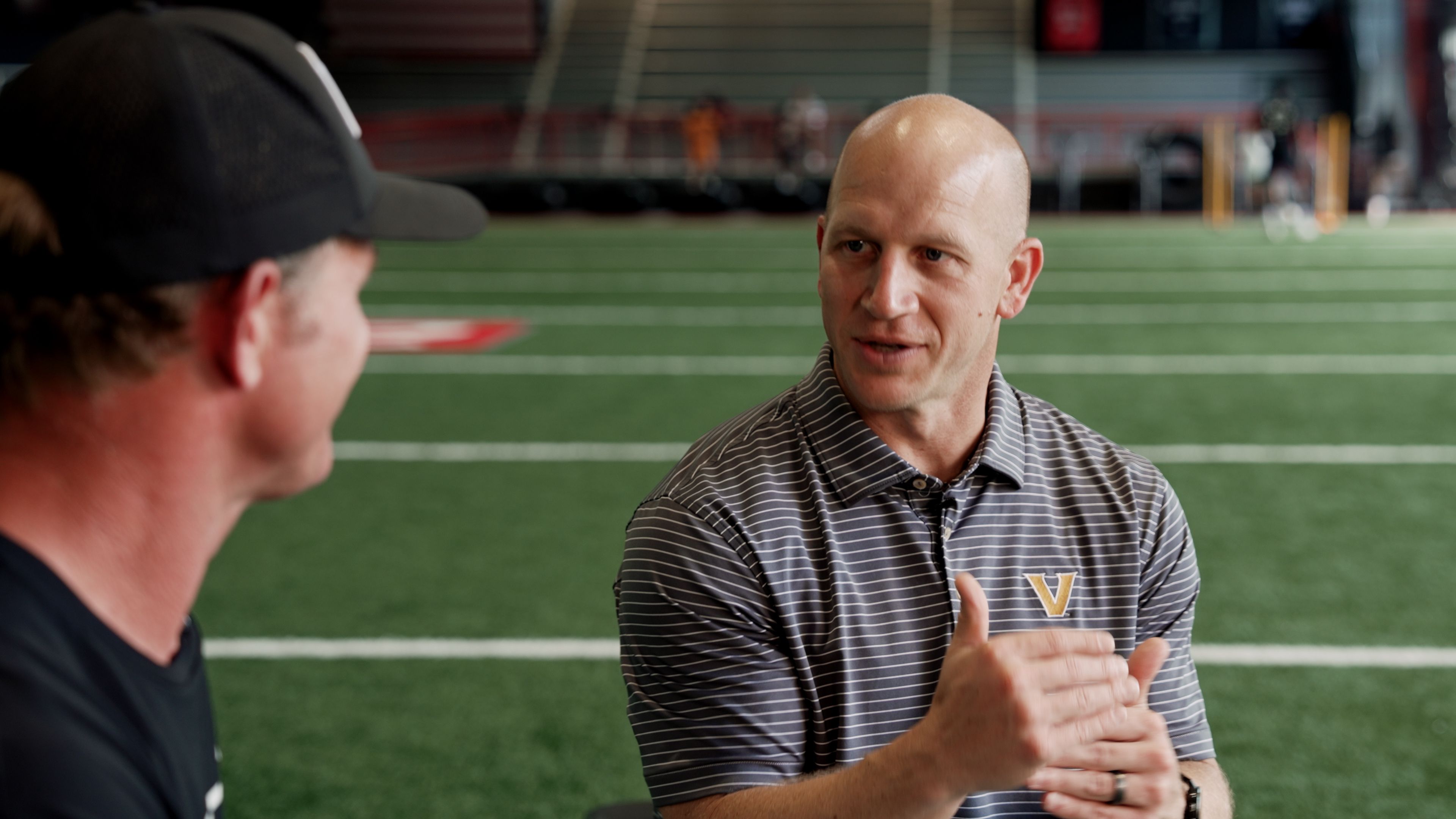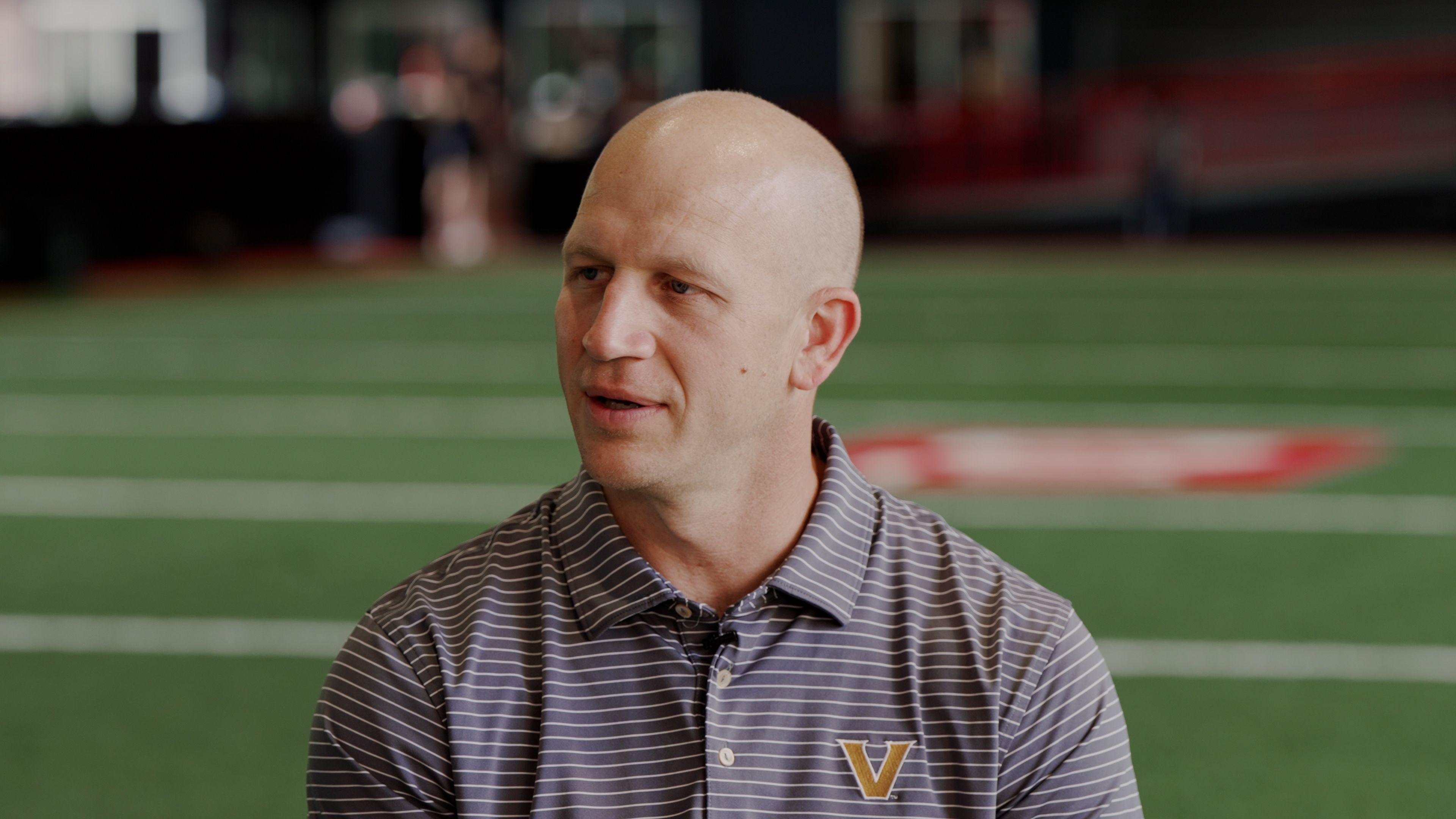The Turf Debuts! Vanderbilt's Clark Lea Shares 7 Insights On Training, Coaching, Struggling, More

After months of anticipation, the first episode of The Turf: Powered By D1 released on Wednesday.
The Turf is hosted by D1 CEO/founder Will Bartholomew and is filmed on location at D1 facilities. The Turf takes viewers and listeners beyond the weight room and into raw, unfiltered conversations with athletes, coaches, celebrities, and influencers who know what it takes to train, compete, and win – on and off the turf.
The first episode features Vanderbilt head football coach Clark Lea, whose team has its season opener against Charleston Southern on Saturday.
Lea and Bartholomew have history together. When Lea was a freshman fullback at Nashville’s Montgomery Bell Academy in the late 1990s, he looked up to Bartholomew, then a senior playing the same position.
Years later, Bartholomew’s oldest son Ty plays linebacker under Lea at Vanderbilt, while Lea’s oldest son trains at D1 West Nashville.
“It’s a cool thing to be able to sit with Will later on in life after following him in high school,” said Lea. “I always looked up to him and even picked my number because of him. Now, his son plays for me and my son trains at D1 – it’s really come full circle. I’m a big believer in training and what D1 is doing to help athletes of all ages. The discipline, the goal setting, the deferred gratification – those are life lessons we can’t take for granted. It’s an honor to be part of this inaugural episode and look forward to tuning in as a loyal subscriber.”
Throughout the 30-minute episode, Lea and Bartholomew discussed a wide variety of topics, ranging from Lea’s athletic career to his biggest lessons learned from coaching at Vanderbilt.
Watch/Listen to The Turf: Powered By D1 on Apple, Spotify, YouTube
From Catcher to Coach
Before ever hitting the gridiron for Vanderbilt as a fullback, Lea played catcher for Birmingham Southern and Belmont, having dreams of making the MLB. However, a battle with the yips caused Lea to reevaluate which sport brought the most joy. “It was the best thing that ever happened to me,” Lea said. “Baseball was stripped away, and I had to start thinking about what sport could teach me rather than what sport could give me.”

The Biggest Flaw He Sees in Youth Sports
Reflecting on his own athletic career, Lea said his greatest lesson was the importance of maintaining joy in youth sports. As a teenager, Lea would play 90 games during the summer and said he felt immense pressure to perform well every time, which took the joy out of the game. “When it becomes life and death for a 13-year-old, that’s when you lose them,” he said. “Sustained success requires fun and a love for the game.”
How the Weight Room Builds Culture
As a player and coach, Lea used the weight room as a way to build culture, describing it as “sacred” for growth and development. “You put two and a half pounds on the bar, you do it, and then you realize you can do more than you thought,” Lea said. “That’s where leadership and confidence are born.”
What Mentors He Learned From
Before coaching at Vanderbilt, Lea had stops at South Dakota State, UCLA, Syracuse and Notre Dame, saying “I’ve been blessed to learn something from every coach I’ve worked with.” At South Dakota State, Lea said, “I learned what dignity and discipline in coaching really looks like.” At his other stops, he also learned how to balance family life with the demands of football and how to effectively build a program.
How He Evolved His Approach at Vanderbilt
When he first got the job at Vanderbilt, Lea admitted that he tried to add culture through non-football ways. Now, Lea admits he’s shifted his approach. “Now everything centers on football—the fundamentals, the love of the game, and developing people,” he said. “We want to be the team that can outlast our opponents physically and mentally.”

The Value of Struggle and Sacrifice
In his first three seasons, Lea won a combined nine games. Last season, the Commodores won seven games and the Birmingham Bowl. “You have to embrace the suffering and sacrifice,” he said. “This is a marathon, not a sprint. We call our players into that challenge every day, and those who can’t sustain it will naturally filter out.”
A Legacy Beyond Wins and Losses
Instead of focusing on scores, Lea said he hopes that his legacy is defined by how he helped his players grow on and off the field. “Ten or fifteen years from now, I want to be remembered for the impact I made on people,” he said. “I want our players to leave here with resilience, character, and a sense of belonging.”
Watch/Listen to The Turf: Powered By D1 on Apple, Spotify, YouTube